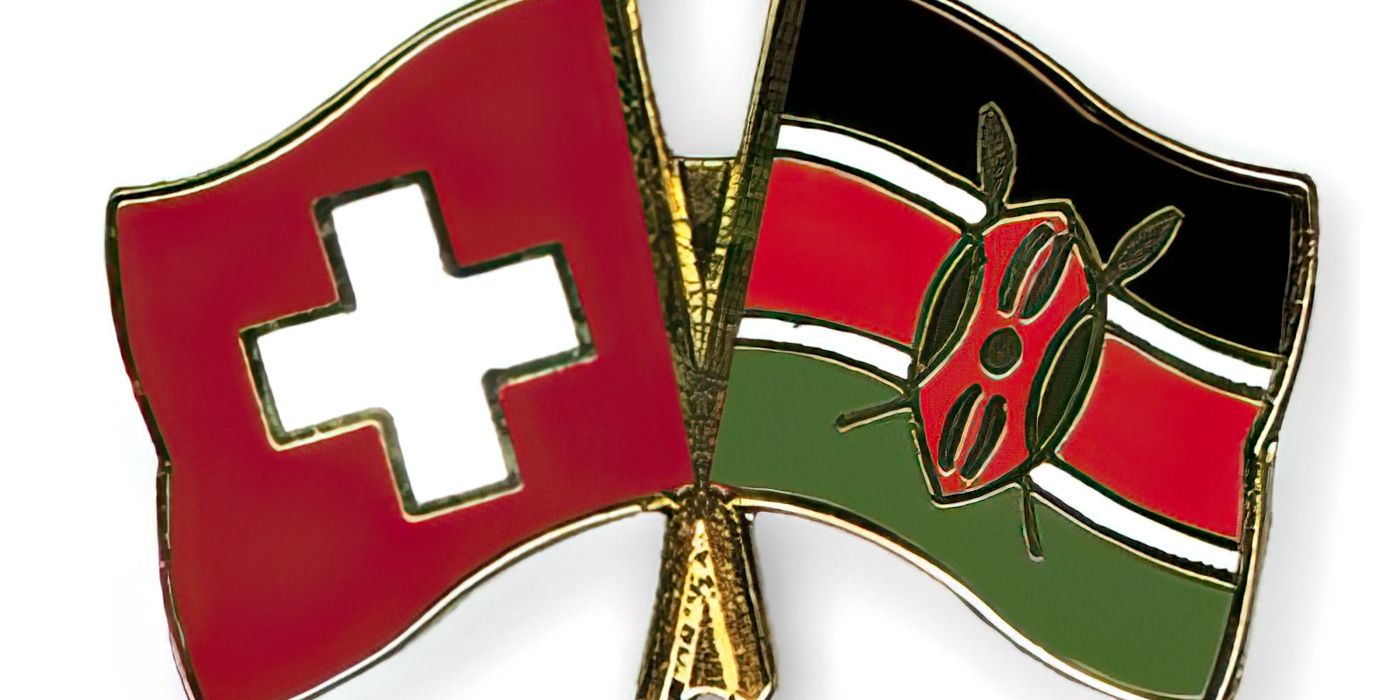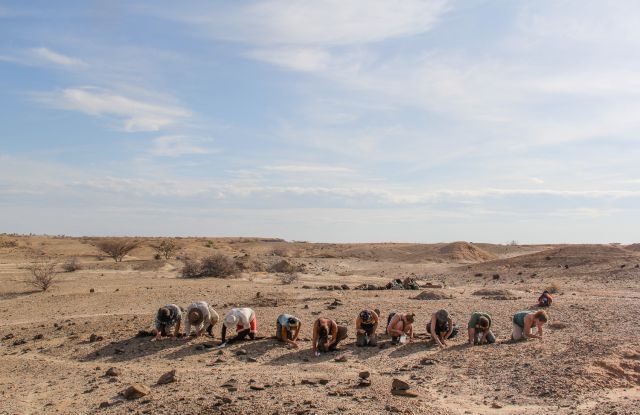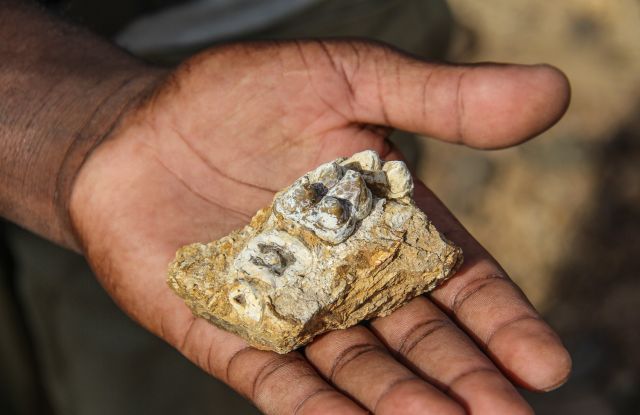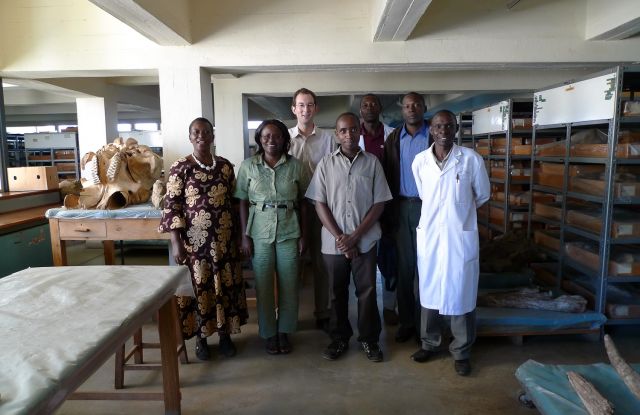

Swiss Ambassador's Visit to the NMK
I thought it useful that both National Museums of Kenya staff and Swiss Embassy guests have some background information on current and potential future Swiss engagement in (East) Africa in the sciences in which the National Museums of Kenya is active. I'm keen that Swiss-Kenyan scientific cooperation increases both in depth and in breath. The National Museums of Kenya, with its evolving research portfolio, its organizational nimbleness and its sizable cadre of PhD-/MSc-level staff, is well placed to offer interesting opportunities for Swiss research teams and individual researchers.
Key Swiss policy documents
"Why more scientific research cooperation with the countries of the East and the South?" Discussion Paper, Commission for Scientific Research Partnerships with Developing Countries, Swiss Academy of Sciences, January 2010.
|
|
Discussion Paper (German) | Discussion Paper (French) |
English Summary: Why should the Swiss taxpayer invest in foreign scientific research partnerships and what is the value-added in relation to the foreign and economic policies of Switzerland in general and Switzerland as a location for scientific research in particular?
The discussion paper searches for answers to these questions and in doing so presents the following 3 theses:
The performance of a scientific research location is determined not only by the quality of its scientific output but also by its ability to translate these into economic and societal benefits. Switzerland must confront these two challenges to secure its leading position in world science.
Despite cross-border partnerships being a key factor in economic development and poverty reduction, the investments of the North including Switzerland in scientific research cooperation with the South and East have not been sufficient to promote regional development.
Scientific research partnerships are not only evidence of solidarity with developing countries but also enable effective diffusion of scientific and technical know-how through co-production, provide early warning of global problems, enable presence in all knowledge markets and assure the strong performance of Swiss scientific research for decades to come.
The answers are also given in an environment in which 80% of the worldwide resources for research and development are being invested in OECD countries and a further 15% in India, China and the industrialized nations of South East Asia. All other countries receive only the remaining 5% even though their economic and societal challenges are the greatest.
"Insight into Swiss Scientific Foreign Policy 2012 and 2013 to 2016: Instruments for bilateral scientific research cooperation with non-European countries" Briefing Paper, State Secretariat for Education and Research, Swiss Federal Department of Home Affairs.
|
|
Briefing Paper (English) |
English Summary: New knowledge is increasingly created in international networks, a trend which has accelerated in the age of globalization. Switzerland leads the world in many scientific disciplines. To share knowledge gained from Swiss research and assure the international competitiveness of Switzerland as a leading location for higher education and research, international cooperation is becoming more important. The Swiss Federal Government channels around 20% of all federal funds for education, research and innovation towards international cooperation (2012 budget for international activities: CHF 586 million, KES 52.8 billion). The specific means include:
(a) Multilateral agreements of the European Union govern participation in European-wide science and technology programs.
(b) Bilateral agreements aim to create the best possible environment for cross-border collaboration between individual scientists and their institutions. Since 2007, seven bilateral agreements have been signed: with Japan, South Africa, South Korea, Slovenia, Ethiopia, United States and Brazil. An agreement with the Russian Federation is currently being negotiated.
(c) Bilateral programs, functioning with the framework given by the bilateral agreements, substantiate cross-border cooperation with projects based on the highest possible scientific quality and sustainable partnerships. Moreover, both countries must equally contribute financially to such projects, and the involved partner institutions must invest some of their own research funds and also acquire additional private funds.
(d) The specialized Swiss science consulates facilitate scientific exchange and promote Switzerland as a location of excellence for science and technology. These consulates are located in strategic science locations throughout the world: Boston, San Francisco, Singapore, Shanghai and Bangalore.
(e) The Swiss science and technology diplomats, based in Swiss embassies throughout the world, are charged with creating optimal conditions for cross-border collaborations between researchers, institutes and universities.
Research within key Swiss universities within the broad research portfolio of the NMK:
|
Current paleontological research projects in East Africa or in other parts of the world: |
Current archeological or paleoanthropological research projects in East Africa or in other parts of the world: |
Current zoological, ecological and evolutionary biology research projects in East Africa or in other parts of the world: |
|---|---|---|
|
University of Basel |
|
|
|
Institute of Geology and Paleontology: none publicized for Africa
Bolivia (Late Cretaceous) |
Institute for Prehistory and Archaeological Science and Seminar for Prehistory and Early History: none publicized for Africa Syria, Austria, France, Spain, Germany, Italy, Slovenia, Lithuania (Pleistocene) France (Holocene) |
Zoological Institute and Section of Conservation Biology: "Translation of DNA variation into organismal diversity as modeled by adaptive radiation of cichlid fishes of East Africa" lead by Prof. Dr. Walter Salzburger unclear engagement with East Africa: "Genetical effects in small populations" lead by Prof. Dr. Samuel Zschokke all over Europe including Finland, France, Romania, Sweden and Denmark as well as United States, Russia, Japan, Malaysia |
|
University of Zurich |
|
|
|
Paleontological Institute and Museum: none publicized for Africa
United States, India, Norway, China, Germany (Triassic) |
Anthropological Institute and Museum: none publicized for East Africa Malaysia, Indonesia, United States, Spain, United Kingdom, France, Australia (Holocene) South Africa, Georgia, Belgium (Pleistocene) Ethnographic Museum: "National museums and museology in Africa. Exhibitions in and about Africa south of the Sahara" lead by Prof. Dr. Thomas Laely |
Institute of Evolutionary Biology and Environmental Studies: none publicized for East Africa "Behavioral endocrinology and eco-physiology as modeled by the African striped mouse" lead by Prof. Dr. Carsten Schradin Botswana, Malaysia, China, Argentina, Russia, Panama |
|
University of Berne |
|
|
|
Institute of Geology: none publicized for Africa |
Institute for Archeological Sciences: none publicized for Africa Germany, France (Holocene) |
Institute of Ecology and Evolution: none publicized for Africa Greece, Germany |
|
University of Geneva |
|
|
|
Department of Geology and Paleontology: none publicized for Africa
Japan, United Arab Emirates, China, Turkey (Permian-Triassic) |
Laboratory for Prehistoric Archeology and Anthropology: none publicized for Africa Italy, France, Albania (Holocene, Pleistocene) |
Department of Genetics and Evolution: none publicized for East Africa "Archeology and Population in (West) Africa" lead by Prof. Dr. Eric Huysecom South America, East Asia |
Swiss federal funding opportunities for possible consideration by the NMK:
| Swiss Programme for Research on Global Issues for Development, Programme on "Sustainable use and management of ecosystems": | call for proposals in Spring 2013, CHF 400'000 to 600'000 (KES 36 to 54 million) per project per year for 6 years, contact: Zora Urech, Swiss National Science Foundation | possible NMK initiating unit: Centre for Biodiversity |
| International Short Visits: | aimed to initiate and consolidate research collaborations; eligibility: doctorate or equivalent, employed researcher; eligible costs: (1) the salaries of scientific and technical project personnel, (2) material costs that are directly related to the realization of the project, namely material of enduring value, expendable items, field expenses, travel costs or third-party charges and (3) costs for the project-related use of infrastructures at institutions or laboratories | apply online at the Swiss National Science Foundation |
| International Exploratory Workshops: | advance knowledge by bringing together scientists from different fields to share their work, clearly-defined scientific aim; possible theme: origin sciences, current field work projects along the African Rift Valley | possible NMK initiating unit: Paleontology Division, possible supporting initiating party: Palaeontological Scientific Trust |
Current Swiss federal scientific institutional and project funding with Africa connections and within the broad research portfolio of the NMK, running at least into 2013:
Permanent Flagship Scheme: Swiss South African Joint Research Programme established in 2007 by the Swiss and South African governments to promote scientific and technological cooperation between Switzerland and South Africa featuring co-funding of joint research projects and faculty and student exchanges.
Permanent Flagship Scheme: Ifakara Health Institute, Tanzania, founded in 1956 as the Swiss Tropical Institute Field Laboratory, today one of Africa's pre-eminent health research organizations. Annual income 2010/11: USD 28 million (KES 2.3 billion), 80% through competitive international research grants, rest from Swiss and other governments.
Permanent Flagship Scheme: Centre Suisse de Recherches Scientifiques (Swiss Center for Scientific Research), Ivory Coast, founded in 1951 under the tutelage of the Swiss Academy of Sciences, today an important West African center for fundamental and applied research in conservation and biodiversity, nutrition and food security, parasitic diseases, and urbanization.
"Bioavailability of soil organic P and microbial P cycling in agricultural soils" lead by Dr. Else Bünemann-König, Swiss Federal Institute of Technology Zurich, Institute of Agricultural Sciences, CHF 478'000 (KES 43 million), 2012-2015
"Collecting Humanity: How Human Remains Are Made into Museum Objects" lead by Prof. Marianne Sommer, University of Lucerne, Historical Seminary, CHF 158'424 (KES 14 million), 2011-2014
"Life history and biogeography: a comparative evolutionary study of the terrestrialization of African amphibians" headed by Dr. Paul Loader, University of Basel, Geographical Institute, CHF 250'000 (KES 22 million), 2011-2013
"Methane oxidation pathways at oxic-anoxic boundaries in lakes" headed by Prof. Bernhard Wehrli, Swiss Federal Institute of Aquatic Science and Technology, CHF 489'322 (KES 44 million), 2011-2014
see also research project headed by Prof. Dr. Eric Huysecom, University of Geneva, Department of Genetics and Evolution, CHF 354'663 (KES 32 million), 2012-2015
see also research project headed by Prof. Dr. Carsten Schradin, University of Zurich, CHF 359'708 (KES 32 million), 2011-2014


